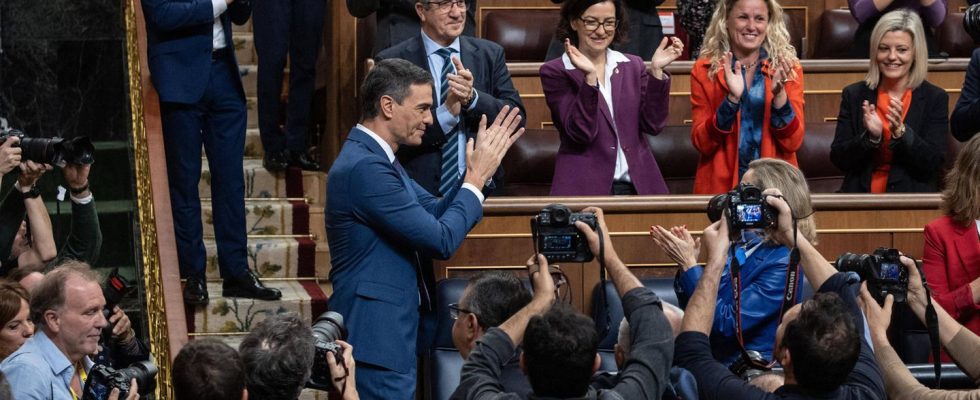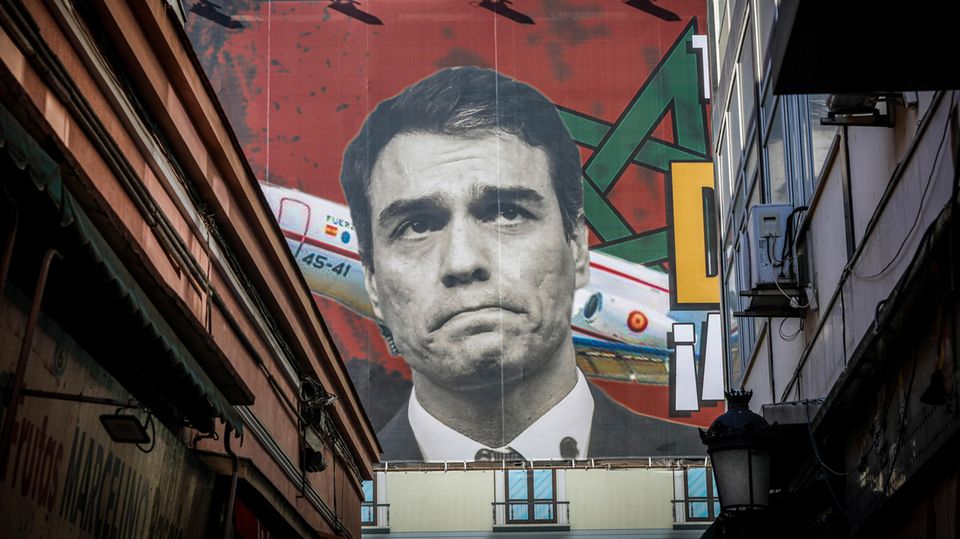Spain
Pedro Sánchez was re-elected head of government with the help of Catalan separatists
Pedro Sánchez during his election in the Madrid Parliament
© ABACAPRESS / Imago Images
Spanish Prime Minister Pedro Sánchez has been re-elected to office. In the vote in Parliament in Madrid, Sánchez achieved an absolute majority of 179 out of 350 votes. Catalan separatists supported him.
The president of the capital region of Madrid, the conservative hopeful Isabel Díaz Ayuso, who is also very influential at the national level, speaks about this. Opposition leader Alberto Núñez Feijóo, who like Ayuso belongs to the popular party PP, said in the debate before the vote on Sánchez’s candidacy that the rule of law, democracy and the unity of the country were at risk. The renowned newspaper “El Mundo” took the same approach. It wrote that Sánchez was conducting a “slow-motion coup” because he had made a “pact with criminals.”
Pedro Sánchez signs deal with separatists
Hard stuff. Is that justified? What did Sanchez do? He has promised the two separatist parties in Catalonia represented in parliament, the left-wing ERC and the liberal Junts, in addition to debt relief of 15 billion euros and other concessions, as well as an amnesty for all “Catalanistas” striving for independence between 2012 and 2023 with the law have come into conflict. According to the bill introduced in parliament this week, that is more than 200 – including Carles Puigdemont, who, as Catalan president, led the failed attempt to secede in autumn 2017. Since then he has been living in exile in Belgium – after a cinematic night-and-fog escape. In between, he was briefly arrested in Schleswig-Holstein.
The fact that Puigdemont could return to Spain as a triumphant after the law comes into force is seen as a huge humiliation by the conservatives, who placed Catalonia under receivership at the time. Sánchez promised four more years of “progress and peaceful coexistence” in the parliamentary debate. Progress perhaps, but Sánchez cannot guarantee peace for the approximately 48 million citizens. On the contrary. Spain is facing turbulent times.
PP protests and calls for new elections in Spain
The PP has already called for a new protest against amnesty and the left-wing government in Madrid on Saturday. “We will not be silenced,” Feijóo shouted angrily. His declared goal: for the government to give up and for new elections to take place.
Booking trends
Spain to India: Ten popular travel destinations for this fall
Just last weekend, the PP mobilized hundreds of thousands across the country. It’s not just the (relatively) moderate opposition that’s taking to the barricades. For 13 nights in a row, thousands of supporters of the right-wing populist Vox have been protesting in front of the socialists’ quarters – sometimes with violence, Hitler salutes and cheers for the dictatorship of Francisco Franco (1939-1975). On Thursday night there were again many injuries and arrests.
Sánchez doesn’t just face resistance on the streets
“The fascists and misogynists are not protesting against the amnesty, but because they did not prevail at the ballot box,” shouted PSOE spokesman Patxi López to the cheers of his party colleagues. The opposition did not make any proposals, neither for the Catalonia conflict nor for other issues such as housing shortages or strengthening the healthcare system. Sánchez accused Feijóo of joining “the reactionary club of (Donald) Trump, (Marine) Le Pen, (Viktor) Orban and (Vox boss) Santiago Abascal.”
But it’s not just on the streets that the opposition will make life difficult for Sánchez. It will also face strong resistance in the courts and parliaments. “Especially when you consider that the PP now governs eleven of the 17 autonomous communities and has an absolute majority in the Senate. This will make it more difficult to pass laws, to make any agreements with the regions, and to govern the country in general,” the newspaper wrote “El Periodico”. Polarization will increase. Hardly anyone in Spain will contradict this analysis – not even Sánchez. Especially since he will probably only form a coalition with the left-wing alliance Sumar, which only gets 152 out of 350 lower house votes. It will be difficult to keep the other partners of all stripes in line.
A political stand-up man
But Sánchez, you also have to keep in mind, is considered a political stand-up man, a clever negotiator and tactician who has always been able to overcome the greatest resistance within and outside his own party, always on the political high wire without a net or double bottom. He was most recently declared politically dead after the regional elections in May this year, when his PSOE and the entire left suffered a terrible defeat. Just one day later, he brought forward the elections that had actually been scheduled for the end of the year – and his move was successful.
The PSOE only took second place behind the PP in the new elections in July. But Feijóo’s candidacy was rejected by the lower house at the end of September – also because of the PP’s cooperation with the right-wing populists from Vox at national and regional levels. But very few people thought it possible that Sánchez would then “square the circle” (newspaper “La Vanguardia”) before the deadline on November 27th and prevent new elections by joining forces with the separatists.


